For three decades, I have had the privilege of knowing João Marcello Bôscoli and Pedro Mariano. Our first of many encounters took place in 1995 at the Mosh Studio in the Western Zone of São Paulo, just around the time the duo had inked a contract with record label Sony Music.
I was well aware of the pedigrees they possessed as sons of a legendary singer. The strong persona of their mother, Elis Regina, had evidently rubbed off on both of them, albeit distinctly. João displayed the wit and charisma of his father, the celebrated journalist Ronaldo Bôscoli while Pedro drew from the observing nature of his “creator”, the renowned pianist and arranger César Camargo Mariano.
Throughout the years, our interactions have run the gamut from the professional to the personal, but one subject had always remained elusive; painstakingly overshadowed by my fear of encroaching boundaries. “What was Elis Regina like behind the stage lights? How did she navigate her role as a mother?”
My curiosity, I was pleased to find, has been quelled by the detailing and depth found in the special “Sou Filho Dela – Elis Regina”, currently on PlayPlus, the streaming service offered by TV Record.
The short length of the presentation, just over half an hour, is packed with unprecedented insight into aspects of Elis’ life, hitherto unknown to her abundant fanbase. It reveals Elis as a doting mother and a devoted homemaker. “She used to drive us to school, do the grocery shopping, and handle household chores…. She was much more than just a voice on a record,” states Pedro Mariano.
João and Pedro were mere children when Elis tragically passed away at just 36, on January 19, 1982. João was eleven, and Pedro was only six at the time. The magnitude of their mother’s stature in the music industry only dawned on them as they stepped into adulthood, and that recollection became the driving force of this revealing documentary.
João recounts, with moving candor, an episode from his infancy when he was written off by doctors due to a severe allergic reaction, only to be nursed back to health by his mother’s unwavering resilience and ceaseless lullabies throughout stressful nights.
Pedro brings forth personal artifacts of Elis – her passport, a wallet containing some old currency, and a tiny owl statue – a Mother’s day gift. The scenes are poignant, drawing a visceral portrait of a son clinging to relics that still echo his mother’s presence.
One of the most transformative elements of the documentary is the decision to host the brothers’ conversation in a setting that replicates their childhood home in Serra da Cantareira, in the North Zone of São Paulo. The familiar surroundings prompt the brothers to piece together fragments of their memories and reconstruct their life at that place, one enriched with a garden where Elis grew and harvested the majority of their family’s food.
To add texture to the narrative, “Sou Filho Dela” intersperses scenes from Elis’ performances and interviews along with testimonials from singer Wanderléa and Marisa Ramos, a childhood friend of the iconic singer.
Memories of João recounting his mother’s initial reaction to the release of Michael Jackson’s “Off the Wall” in 1979 or citing her proverbial advice while deciding upon what culinary delight to savor for dinner, paint a striking picture of their familial closeness. A blend of Elis Bôscoli’s nuances, which I find utterly irresistible. However, the most intimate connection to their family was found within “Sou Filho Dela.”
Sergio Martins, Brazil Journal
